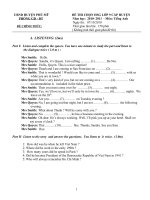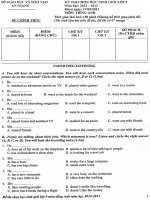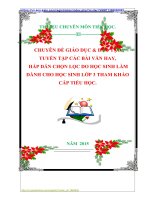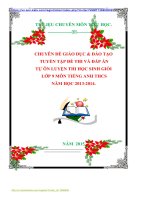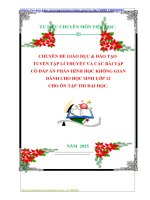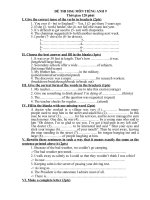- Trang chủ >>
- Đề thi >>
- Đề thi lớp 9
CHUYÊN ĐỀ GIÁO DỤC ĐÀO TẠO TUYỂN TẬP ĐỀ THI VÀ ĐÁP ÁN TỰ ÔN LUYỆN THI HỌC SINH GIỎI LỚP 9 MÔN TIẾNG ANH THCS NĂM HỌC 20132014.
Bạn đang xem bản rút gọn của tài liệu. Xem và tải ngay bản đầy đủ của tài liệu tại đây (761.18 KB, 127 trang )
/>TƯ LIỆU CHUYÊN MÔN TIỂU HỌC.
CHUYÊN ĐỀ GIÁO DỤC & ĐÀO TẠO
TUYỂN TẬP ĐỀ THI VÀ ĐÁP ÁN
TỰ ÔN LUYỆN THI HỌC SINH GIỎI
LỚP 9 MÔN TIẾNG ANH THCS
NĂM HỌC 2013-2014.
NĂM 2015
/> />LỜI NÓI ĐẦU
Trong giai đoạn xã hội hóa và hội nhập quốc tế hiện nay, nguồn
lực con người Việt Nam trở nên có ý nghĩa quan trọng, quyết định
sự thành công của công cuộc phát triển đất nước. Giáo dục ngày
càng có vai trò và nhiệm vụ quan trọng trong việc xây dựng thế hệ
người Việt Nam mới, đáp ứng yêu cầu phát triển kinh tế - xã hội.
Đảng và nhà nước luôn quan tâm và chú trọng đến giáo dục. Với
chủ đề của năm học là “Tiếp tục đổi mới quản lý và nâng cao chất
lượng giáo dục” đối với giáo dục phổ thông. Mà trong hệ thống giáo
dục quốc dân, thì bậc Trung học phổ thông có ý nghĩa vô cùng quan
trọng là hình thành nhân cách con người nhằm giúp học sinh hình
thành những cơ sở ban đầu cho sự phát triển đúng đắn và lâu dài về
đạo đức, trí tuệ, thể chất, thẩm mĩ và các kĩ năng cơ bản để học sinh
tiếp tục học Trung học cơ sở. Để đạt được mục tiêu trên đòi hỏi
người dạy học phải có kiến thức sâu và sự hiểu biết nhất định về nội
dung chương trình sách giáo khoa, có khả năng hiểu được về tâm
sinh lí của trẻ, về nhu cầu và khả năng của trẻ. Đồng thời người dạy
có khả năng sử dụng một cách linh hoạt các phương pháp và hình
thức tổ chức dạy học phù hợp với đối tượng học sinh. Căn cứ chuẩn
kiến thức kỹ năng của chương trình lồng ghép giáo dục vệ sinh môi
/> />trường, rèn kĩ năng sống cho học sinh. Coi trọng sự tiến bộ của học
sinh trong học tập và rèn luyện, động viên khuyến khích không gây
áp lực cho học sinh khi đánh giá. Tạo điều kiện và cơ hội cho tất cả
học sinh hoàn thành chương trình và có mảng kiến thức dành cho
đối tượng học sinh năng khiếu. Việc nâng cao cất lượng giáo dục
toàn diện cho học sinh là nhiệm vụ của các trường phổ thông. Để có
chất lượng giáo dục toàn diện thì việc nâng cao chất lượng HSG là
vô cùng quan trọng. Trong đó môn Tiếng Anh có vai trò vô cùng
quan trọng giúp phát triển tư duy tốt nhất. Để có tài liệu ôn luyện,
khảo sát chất lượng học sinh Giỏi lớp 9 THCS kịp thời và sát với
chương trình học, tôi đã sưu tầm biên soạn các đề thi HSG lớp 9 cấp
tỉnh THCS giúp giáo viên có tài liệu ôn luyện. Trân trọng giới thiệu
với thầy giáo và cô giáo cùng quý vị bạn đọc tham khảo và phát
triển tài liệu:
CHUYÊN ĐỀ GIÁO DỤC & ĐÀO TẠO
TUYỂN TẬP ĐỀ THI VÀ ĐÁP ÁN
TỰ ÔN LUYỆN THI HỌC SINH GIỎI
LỚP 9 MÔN TIẾNG ANH THCS
NĂM HỌC 2013-2014.
Chân trọng cảm ơn!
/> />CHUYÊN ĐỀ GIÁO DỤC & ĐÀO TẠO
TUYỂN TẬP ĐỀ THI VÀ ĐÁP ÁN
TỰ ÔN LUYỆN THI HỌC SINH GIỎI
LỚP 9 MÔN TIẾNG ANH THCS
NĂM HỌC 2013-2014.
BÀI TẬP HỌC SINH GIỎI TIẾNG ANH LỚP 9
I. VOCABULARY AND GRAMMAR
Part 1 : Supply the correct verb tense.
Last week I (walk)(1) home after playing
tennis when it (start)(2) raining very heavily.
"Oh, no. I (get)(3) soaked before I (reach)
(4) home." I thought " I wish I (remember)
/> />(5) to bring my raincoat." But unfortunately I (leave)
(6) it at home. " How stupid of me! I always
(get)(7) to bring it with me." Luckily just
then a friend of mine passed in her car and offered me a lift. "(You
go)(8) home? she asked me, "or (you want)(9)
to go for a drink?" " I think I'd rather you
(take)(10) me home." I said.
Part 2: Complete each sentence with a phrase from box A
followed by a phrase from box B. Do not use any phrase more
than once.
A
B
clear up
keep on advertising
picked out
rush into
ring you back
burst into tears
is getting on well
will be taking off
got over
brought him up
as she waved goodbye.
when I get home.
anything
in his new job.
her tragic loss.
until we find someone
suitable.
on her farm in Cornwall.
in two hours' time
the best display.
his room before doing
/> />his homework
1.
I'll
2. The
plane
3. The boy was told
to
4. Tom's
grandmother
5. It was a long time before
she
6.
John
7. We'll have
to
8. The competition
judges
/> />9.
Daisy
10. Think about it.
Don't
II. READING
Part 1: Read the following passages carefully, then choose the ONE
best answer to each question
Passage 1:
At the age of sixty-five, Laura Ingalls Wilder began writing a
series of novels for young people based on her early experiences
on the American frontier(linh vuc) . Born in the state of
Wiscosin in 1867, she and her family were rugged (khó nhọc)
pioneers(người đi đầu) . Seeking(theo đuổi ) better farm land,
they went by covered wagon(xe ngựa) to Missouri in 1869, then
on to Kansas the next year, returning to Wisconsin in 1871, and
traveling on to Minnesota and Lowa before settling(bố trí)
permanently(cố định) in South Dakota in 1879. Because of this
continuing moving, Wilder's early education took place
sporadically(không thương xuyên) in a succession of one-room
/> />schools. From age thirteen to sixteen she attended school more
regularly although she never graduated.
At the age of eighteen, she married Almanzo James Wilder.
They bought a small farm in the Ozarks, where they remained
for the rest of their lives. Their only daughter, Rose, who had
become a nationally known journalist, encouraged her mother
to write. Serving as agent and editor, Rose negotiated(đàm phán
thương lượng) with Harper's to publish her mother's first book,
Little House on the Big Woods. Seven more books followed, each
chronicling her early life on the plains. Written from the
perspective(triển vọng, tiền đồ) of a child, they have remained
popular with young readers from many nations. Twenty years
after her death in 1957, more than 20 million copies had been
sold, and they had been translated into fourteen languages. In
1974, a weekly television series, "Little House on the Prairie ",
was produced based on the stories from the Wilder books.
1. What is the main topic of the passage?
A. American pioneer life B.
Children's literature
C. A weekly television series D. Wilder' s
career
2. Laura Ingalls Wilder began writing novels
/> />A. when she was a child on the frontier B. right
after she moved to the Ozarks
C. when she was a young mother D. after her sixty-
fifth birthday
3. The author mentions all of the following events in the life of
Laura Ingalls Wilder EXCEPT
A. She went west by covered wagon B. She
graduated from a one-room school
C. She married Almanzo Wilder D. She had
one daughter
4. Wilder's early education took place
A. with great success B. for a long
time
C. at irregular intervals D. in a
very efficient way
5. Written from the perspective of a child, they have remained
popular THEY refers to
A. the plains B. many nations C. more
books D. young readers
6. It can be referred from the passage that
/> />A. Laura Ingalls Wilder wrote scripts for the television
series.
B. the Wilders were not happy living in the Ozarks.
C. Wilder's daughter was not a successful writer.
D. the Wilders books have a universal appeal.
7. Laura Ingalls Wilder died in
A. 1967 B. 1957 C. 1947 D.
1977
8. Laura Ingalls Wilder's family lived forever in South Dakota
since
A. 1867 B. 1869 C. 1879
D. the age of 65
Passage 2:
As trees grow old they add a new ring for each year, this
discovery, it seems, was first made by Leonardo da Vinci, the
famous Italian painter and scientist. It took a long time,
however, before the serious study of tree rings started; this was
done in Arizona by Andrew Ellicott Douglas.
Douglas developed a simple technique for dating trees called
cross-dating and for a period of over twenty years continued
/> />the study of tree rings. He spent much of his time in logging
camps near Flagstaff.
The Douglas method has been used by many scientists.
Some of them used it to examine logs in Indian pueblo ruins;
they were able to date the buildings right back to the tenth
century. Others used it to date the world's oldest living trees,
the bristlecone pines.
1. What can be inferred from the first paragraph?
A. Leonardo made many discoveries.
B. Leonardo was famous as a painter
C. Leonardo was interested in the aging process
D. Leonardo became famous because of his tree ring
discovery.
2. What also can be inferred from the first paragraph?
A. Leonardo started the serious study of tree rings.
B. Leonardo's discovery was not developed for many years.
C. Tree rings were studied in Arizona for a long time after
Leonardo.
D. Douglas was a famous Arizona scientist.
3. What can be inferred from the second paragraph?
/> />A. The term cross-dating was invented by Douglas.
B. An uncomplicated method of tree-dating was
discovered by Douglas.
C. It took Douglas 20 years to developed a tree-dating
technique.
D. The technique of cross-dating was developed near
Flagstaff.
4. What also can be inferred from the second paragraph?
A. Logging camps are good places for studying tree rings.
B. Douglas spent 20 years near Flagstaff.
C. Douglas spent most of his life studying tree rings.
D. There are courses for studying tree rings near Flagstaff.
5. What can be inferred from the last paragraph?
A. The Douglas method has been used since the 10
th
century.
B. Indians used the Douglas method to examine loggs.
C. The earliest known trees can be dated by the Douglas
method.
D. Indians used bristlecone pines to construct their
buildings
/> />6. What can be inferred from the last paragraph?
A. American Indians lived in the region investigated
nearly a thousand years ago.
B. The Douglas method can be used to date all the 10
th
century ruins.
C. Scientists dated the bristlecone pine to the 10
th
century.
D. The Indian pueblo ruins were not as old as the
bristlecone pines.
7. What was involved in the passage?
A. Leonardo spent much of his time in logging camps near
Flagstaff.
B. Leonardo spent much of his time in logging.
C. Leonardo spent much of his time in examining logs.
D. None is correct.
Part 2: Fill in each numbered space with ONE suitable word
Six years ago when I was a student, I was (1)
of money. So once a week I (2) to go home to see
my parents and get a decent meal. Although I had a good
relationship with my mother, I never got (3)
well with my father. I could never live up to his high
/> />expectations of me. One day I did a (4) terrible
thing. I stole some money from him. I asked him if he
(5) lend me ten pounds. He refused saying he had
(6) given me enough and it was (7) I
became more responsible with money. You know what it is
like (8) a student. I'd run out of money and
wanted to take a girl out. When he refused I (9)
him of being mean. and we had a terrible row. He left the
house and I was (10) angry that I stole ten pounds
from his wallet.
When he (11) out that the money was gone,
he (12) who had (13) it and
banned me from the house. (14) then I have
returned but he has never really forgiven me and still
(15) down on me for (16) I did. My
mother is very upset and I really (17) to work
towards creating a happy relationship with my father for
(18) own sakes. Half of me wants to say: "
Sorry, Dad" while (19) other half still thinks he is
ridiculous (20) having kept this attitude up for so
long.
III. WRITING
/> />Part 1: Complete the second sentence so that it has a similar
meaning to the first sentence.
1. In the briefcase you will find a map, a file and a calculator.
The
briefcase
2. Pierre emigrated to Brazil in 1991 and is still there.
Pierre
has
3. Are you sure that jacket is the right size for you?
Does that
jacket
?
4. There may be some delay in obtaining the permit.
Perhaps
there
5. I gave Ted the message, but he already knew about it.
/> />I
needn't
6. He is a fascinating lecturer because he knows a lot about his
subject.
His
wide
7. I'd prefer you to sign the contract without any further
delay.
I'd
rather
8. Lola said she was sorry she had not attended the meeting.
Lola apologized
for
9. We know that feudalism lasted for hundreds of years in
Europe.
Feudalism
/> />10. I was very sorry I wasn't able to see him off at the station.
If
only
Part 2: In most lines of this text there is one unnecessary word. It
is either grammatically wrong or does not make sense. Write the
unnecessary words on the spaces on the right. Tick (ü) any lines
that are correct.
In the United Kingdom women can see
1
their doctor on the average five times a
2
year, compared with a men who visit
3
their doctor about three times a year.
4
Two out of three women leave from their
5
GP's surgery clutching a prescription. Yet
6
/> />women have been taking tablets without
7
knowing that what effect they may have on
8
their bodies, because of a scientific anomaly –
9
the most drugs are tested on the men. In addition,
10
there are well-known examples of the way drugs
11
and other substances should work differently
12
in women. The different balance of the fat and
13
muscle in men's and women's bodies affects to
14
the speed with which alcohol is absorbed and
15
broken down, for example. It is being predicted
16
/> />that natural remedies will continue to gain
17
in the popularity as women, in particular, are
18
become more aware of the possible side-effects
19
of which the powerful drugs currently being prescribed
20
/> />DẤP ÁN
I. VOCABULARY AND GRAMMAR
Part 1.
1. was walking 3. will get 5. had remembered 7. am
always getting 9. do you want
2. started 4. reach 6. had left 8. Are you going
10. took
Part 2.
1. I'll ring you back when I get home.
2. The plane will be taking off in two hours' time.
3. The boy was told to clear up his room before doing his
homework.
4. Tom's grandmother brought him up on her farm in
Cornwall.
5. It was along time before she got over her tragic loss.
6. John is getting on well in his new job.
/> />7. We'll have to keep on advertising until we find someone
suitable.
8. The competition judges picked out the best display.
9. Daisy burst into tears as she waved goodbye.
10. Think about it. Don't rush into anything.
II. READING:35 points
Passage 1. (8 points)
Q
#
1 2 3 4 5 6 7 8
Ke
y
D D B C C D B C
Passage 2. (7 points)
Q
#
1 2 3 4 5 6 7
Ke
y
C B B A C B D
Part 3.
1. short 4. very 7. time 10. so
13. done 16. what 19. the
2. had 5. could 8. being 11. found 14. since 17.
try 20. in
/> />3. on 6. already 9. accused 12. knew 15.
looked 18. our
III. WRITING
1. In the briefcase you will find a map, a file and a calculator.
The
briefcase
1. The briefcase contains a map, a file and a calculator.
2. Pierre emigrated to Brazil in 1991 and is still there.
Pierre
has
2. Pierre has been living/lived in Brazil since 1991.
3. Are you sure that jacket is the right size for you?
Does that
jacket
?
3. Does that jacket really fit you?
4. There may be some delay in obtaining the permit.
/> />Perhaps
there
4. Perhaps there will be some delay in obtaining the permit.
5. I gave Ted the message, but he already knew about it.
I
needn't
5. I needn't have given Ted the message because he already
knew about it.
6. He is a fascinating(hấp dẫn, lôi cuốn ) lecturer because he
knows a lot about his subject.
His
wide
6. His wide knowledge of his subject makes him/means he is a
fascinating lecturer.
7. I'd rather you signed the contract without any further delay.
I'd
rather
/> />7. I'd prefer you to sign the contract without any further
delay.
8. Lola said she was sorry she had not attended the meeting.
Lola apologized
for
8. Lola apologized for not attending/ having attended the
meeting.
9. We know that feudalism lasted for hundreds of years in
Europe.
Feudalism
9. Feudalism is known to have lasted for hundreds of years in
Europe.
10. I was very sorry I wasn't able to see him off at the station.
If
only
10. If only I had been able to see him off at the station.
/> />Part 1 . (10 points)
Part 2. (20 points)
1 can 11 ü
2 the 12 should
3 a 13 the
. 4 ü 14 to
5 from 15 ü
6 ü 16 being
7 ü 17 ü
8 that 18 the
9 ü 19 are
10 the 20 which
§Ò sè 21:
chän ®éi tuyÓn ®i thi häc hsg cÊp huyÖn líp 9 THCS
N¨m häc 2013-2014
M«n tiÕng anh
Thêi gian lµm bµi: 150 phót ( Kh«ng kÓ thêi
gian giao ®Ò )
Question 1: Supply the correct forms of the verbs in brackets.
People always (blame) their circumstances for what they are.
/>
